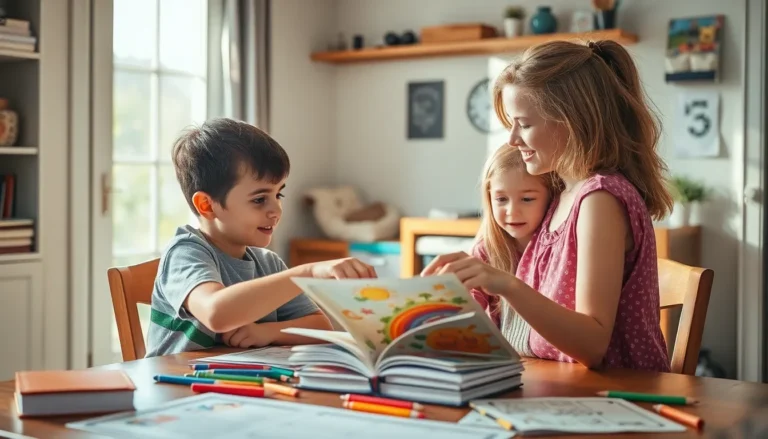Table of Contents
ToggleWhen it comes to parenting, it turns out there’s more than one way to raise a tiny human. From the strict taskmasters to the laid-back pals, parenting styles can shape a child’s future in ways that are both profound and, let’s face it, sometimes hilarious. Ever wondered if your parenting style is more “cool cucumber” or “drill sergeant”?
In the world of AP Psychology, understanding these styles isn’t just a fun fact; it’s a key to unlocking the mysteries of child development. Whether you’re a helicopter parent hovering over every decision or a free-range guardian letting your kids roam, knowing the ins and outs of these styles can help you navigate the wild ride of parenthood. Buckle up as we dive into the fascinating realm of parenting styles and discover which one might just be your secret weapon in raising well-adjusted kids.
Overview of AP Psych Parenting Styles
AP Psychology identifies four primary parenting styles: authoritative, authoritarian, permissive, and neglectful. Each style embodies unique characteristics that shape child development.
Authoritative parenting combines warmth and structure. Parents set clear expectations while remaining responsive to their children’s needs. Research indicates that children raised in this environment often exhibit higher self-esteem, better social skills, and improved academic performance.
Authoritarian parenting is marked by high demands and low responsiveness. These parents enforce strict rules with limited flexibility. Children in this context may develop obedience but often struggle with self-regulation and social competence.
Permissive parenting is characterized by leniency and minimal rules. Parents are nurturing but lack consistency in discipline. Consequently, children raised in permissive households might experience challenges with authority and emotional control.
Neglectful parenting entails a lack of both responsiveness and demands. Such parents are indifferent to their children’s needs. Consequently, children in neglectful environments may face issues with attachment and self-worth.
Understanding these styles provides insight into their long-term effects on children’s behavior and development. Data from psychology studies underscore the significance of parenting approaches in shaping a child’s future. Grasping these styles allows individuals to reflect on their own methods, enhancing their parenting skills and promoting healthier child development.
Authoritative Parenting
Authoritative parenting balances warmth with structure. Parents who adopt this style provide clear expectations while remaining responsive to their children’s needs.
Characteristics of Authoritative Parenting
Authoritative parents maintain high expectations and nurture independence. They use reasoning and communication rather than punishment, promoting open dialogue with their children. Consistent discipline paired with affection fosters a secure attachment, leading to mutual respect. These parents encourage autonomy while establishing clear boundaries, allowing children to explore their environment within defined limits.
Effects on Child Development
Children raised by authoritative parents often exhibit higher self-esteem and better social skills. They navigate relationships more effectively and show increased emotional regulation. Studies indicate that these children tend to perform better academically, benefiting from their parents’ support and guidance. Conflict resolution skills often develop as children learn to express their thoughts and feelings. Overall, authoritative parenting creates a strong foundation for lifelong success and well-being.
Authoritarian Parenting
Authoritarian parenting combines strict rules and demands with low warmth and responsiveness. This style focuses on obedience and discipline, prioritizing rules over emotional connections.
Characteristics of Authoritarian Parenting
Common traits define authoritarian parenting. Parents maintain rigid guidelines that children must follow without question. Communication tends to be one-sided, with parents dictating rather than discussing. Punishments often replace positive reinforcement, emphasizing control instead of support. Independence is typically discouraged, leading to a lack of negotiation or flexibility in rules. Overall, parents strive for obedience while minimizing emotional engagement.
Effects on Child Development
Children raised in authoritarian environments often face distinct outcomes. These children may exhibit high levels of obedience, but they might struggle with self-regulation. Emotional expression suffers as kids learn to suppress feelings to comply with expectations. Academic performance can be uneven; some thrive under pressure, while others experience anxiety and fear of failure. Social skills may lag, with challenges in peer relationships and communication due to a focus on compliance rather than collaboration. Understanding these influences highlights the importance of balancing authority with responsiveness in parenting.
Permissive Parenting
Permissive parenting allows children significant freedom with few restrictions. This style prioritizes emotional connection over rules and expectations.
Characteristics of Permissive Parenting
Permissive parents exhibit warmth and nurturing behaviors, often equating love with lack of discipline. They rarely enforce rules or limits, allowing children to make their own decisions, regardless of consequences. Communication tends to be open, encouraging children to express feelings and opinions. Children receive little guidance on appropriate behavior, leading to an emphasis on choice rather than responsibility. Flexibility defines this style, where parents may avoid conflict over rules to maintain a positive relationship.
Effects on Child Development
Children raised in permissive environments often struggle with self-discipline and authority. They may exhibit difficulty managing emotions and expectations in more structured settings. Without consistent boundaries, these children might develop challenges in social interactions, often appearing entitled or unruly. Academic performance can suffer due to lack of motivation and reliance on personal autonomy over external direction. Overall, the absence of limits may hinder emotional regulation, impacting relationships and personal development.
Uninvolved Parenting
Uninvolved parenting, sometimes referred to as neglectful parenting, combines a lack of responsiveness with minimal demands. This approach results in minimal emotional support and engagement with children.
Characteristics of Uninvolved Parenting
Uninvolved parents often provide little structure or guidance in their children’s lives. Emotional connection remains weak, and parents show limited interest in their children’s activities, needs, or opinions. Many make few demands for appropriate behavior, creating an environment where children lack boundaries. Instances of neglect may manifest in failing to provide for basic needs, whether physical, emotional, or educational. Examples include disregarding school attendance or showing indifference to personal hygiene. Uninvolved parenting can lead to a sense of isolation and unworthiness in children, highlighting its detrimental nature.
Effects on Child Development
Children raised by uninvolved parents often struggle with various developmental challenges. A lack of emotional support contributes to low self-esteem, as these children frequently develop feelings of unimportance. Many experience difficulties in forming secure attachments, leading to problems in relationships later in life. Behavioral issues may arise due to a lack of guidance and reinforcement. Academic performance tends to suffer, as children lack the encouragement needed for motivation. Long-term outcomes include higher rates of mental health issues, emphasizing the significant impact of uninvolved parenting on children’s overall development.
Recognizing the impact of different parenting styles is crucial for fostering healthy child development. Each style offers unique advantages and challenges that shape children’s emotional and social growth. By reflecting on their own approach, parents can make informed decisions that align with their values and goals.
Embracing the principles of authoritative parenting may lead to more positive outcomes, while understanding the pitfalls of authoritarian, permissive, and uninvolved styles can help avoid common developmental issues. Ultimately, the journey of parenting is about finding balance and creating an environment where children can thrive.







